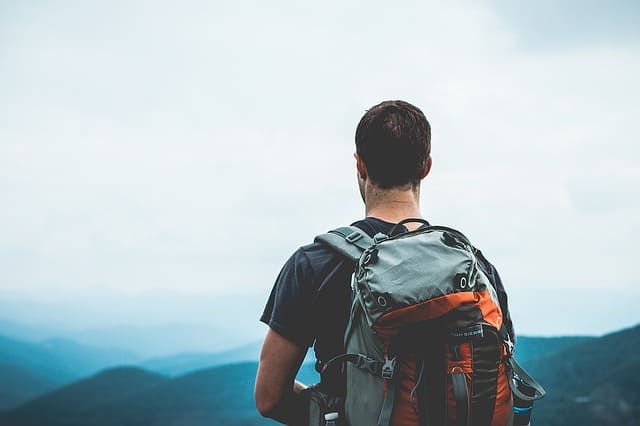How Do I Prepare For My First Backpacking Trip?
To prepare for your first backpacking trip, you will want to get in shape for backpacking, study what you bring, and have an experienced backpacker help you pack your backpack. Spending slightly more money for more effective and efficient gear (or borrowing if you can) can save you unnecessary stress and muscle fatigue.
Before venturing out, try out some of the skills you will be using close to home. Practice using your backpacking stovetop, preparing a dehydrated meal, and camping in a tent/sleeping bag.
For your first backpacking trip, try to go with someone who has been backpacking before. In addition, print out a map of the trails on which you will be hiking and study the distances. As a beginner, choose a distance that will not be too challenging.
How Do I Get In Shape For A Backpacking Trip?
The best way to get in shape for backpacking is to practice.
If you are a beginner, start by going on a fairly challenging hike near your home twice a week. Increase to three times a week. When this becomes more manageable, over the course of weeks or months, begin to add weight to your back. Start with a normal-sized backpack with a hip strap for support. Pack a few water bottles to begin, and then increase the weight over time.
As you become stronger in this specific set of skills–hiking while carrying weight–lengthen the hike as well as the weight. This will prepare you for the backpacking trips that most interest you.
Another way to get into shape for backpacking is by getting a gym membership and climbing the “stair-stepping” machine 2-3 times per week. This will build your quadricep muscles sufficiently to help you climb an especially steep backpacking journey. Once again, you will want to start with no weight at a speed that is comfortable for you. Slowly, increase the amount of weight you are carrying on your back (either in a backpacking backpack or just a regular school backpack), as well as the speed of the machine.
One other aspect of backpacking that often goes overlooked is the amount of back strength needed. To increase your back strength, consider using the rowing machine at your local gym as well as lifting weights.
What Are The Essentials For Backpacking?
A Backpack
If you’re wanting to make backpacking a full-time hobby, you’ll want to make sure and invest a decent amount of money into a quality backpack. If you use a normal backpack, like a school or 72-hour kit kind of backpack, you might pay for it through back and hip pain after the hike.
If you’re willing to invest, you will need a sturdy, reliable, lightweight backpack. Preferably one that is specific to backpacking. You want this backpack to be able to hold most of the weight of the pack on your hips through a supportive hip strap. This is an investment that is necessary for having a positive backpacking experience.
A Tent
Certain tents are made specifically for backpacking. Although they are small, they provide shelter from the weather as well as any predators in the wild.
The tent you get for backpacking should be lightweight. After going through this list, and adding to it with your own essentials, you’ll notice your pack starts to get kind of heavy. Buying a quality, lightweight will save your muscles and energy in the long run.
A Sleeping Pad or Bag
Backpacking often leads to tiny campsites with very little flat ground. Save yourself an extra sore back by packing a lightweight, thin backpacking sleeping pad. Pack a sleeping bag that can help you retain heat if camping in a cold area.
Some Food and Water
Backpacking favorites include packs of oatmeal, a cup of noodles, trail mix, granola bars, dehydrated meals, pancake mix, hot chocolate mix, dried fruit, and beef jerky.
In most cases, the sleeping bag will be the biggest thing you put into your pack, so make sure it’s one that is built for your specific type (location, climate, temperature) of hiking.
A Compact Backpacking Stove
A lightweight backpacking stove is essential for boiling water and cooking food. My favorite is the trifold stove that uses butane as fuel. You can get 3 to 4 hours of cooking out of one tank of butane.
I love the fact that this stove folds up and with the fuel is able to fit inside of the pots for easy storage.
A Quality Water Filter
In case you run out of water before you reach camp or are stuck in an emergency situation, you will want to have a water filter to drink from nearby sources of water. Staying hydrated is a must.
The Sawyer Mini Water Filter is compact, light, and can filter up to 100,000 gallons of water. It can also screw right onto a water bottle for easy use. Check out this quick review I did comparing Sawyer to the LifeStraw.
A Flashlight
Necessary for navigating the dark, a flashlight can help you after the sun goes down.
Toilet Paper and Toiletries
Although not many people talk about this one, you will need to pack in your own toilet paper. There are usually wooden toilets at major campsites, but no toilet paper is provided. In addition, pack in a toothbrush, bug spray, and sunscreen.
If you don’t want to worry about bringing a large roll of toilet paper, you can always use Coin Tissue. Check out my video explaining all about Coin Tissues.
Trash Bags
Most backpacking areas have a “pack it in, pack it out” rule, meaning you must carry any and all trash you accumulate out of the campsite. The trash bag can be tied to your backpack as you hike out of the campsite.
A Permit
Camping overnight in backpacking sites almost always requires a reservation or a permit. Check out individual park sites in order to align with whatever it is they require.
What Should You Not Bring Backpacking?
Avoid anything unnecessarily heavy, such as cans of food, too many clothes or shoes, or bulky items. Only include the minimum of what you need for the number of days that you will be backpacking.
We have such comfortable lives that sometimes it’s hard to not pack everything you could possibly ever use in the wild. Packing things for the “what if” scenarios should be limited. Chances are you’ll end up only using half of your stuff but still have to carry the additional weight throughout the who trip.
What Should I Pack For A 3-day Backpacking Trip?
To start, pack the above 10 necessary items. Make sure to plan out your meals for each day, taking into account that you will be burning more calories than usual with the physical exertion of backpacking. Pack extra snacks. The average amount of food per person per day should be around 2 pounds.
In addition, make sure to check the weather in your area and prepare accordingly. It is necessary to select a sleeping bag that will keep you warm. Pack a disposable rain poncho in case of rain and wool socks in case of cold.
How Much Weight Should My Pack Weigh For A 3-Day Hike?
On average, you shouldn’t pack more than 20% of your body weight on any backpacking trip. For example, if you weigh 150 pounds, your pack should not exceed 30 pounds.
As mentioned multiple times in this article, every item you choose needs to be considered based on the weight it carries. 3 days of hiking is a long time to pack around items you never use.
Go as light as you can on your first trip and if you decide it would have been nice to have something you didn’t bring, bring that item the next time around.
RELATED: Minimum Calories Per Day To Survive
Why Do Hikers Go Missing So Often?
Although this depends entirely on the individual situation, most hikers go missing when they are (1) on their own, (2) in an unfamiliar area, and (3) overly confident in their skills or surroundings.
The best way to stay safe is to always be with another person. Hike in places that you know, or hike with others who are familiar with the area. If the area is known for being at higher risk, bring a first-aid kit for injuries, as getting injured while missing greatly increases your chances of death.
Always approach hiking or backpacking with humility and awareness. Letting down your guard can be fatal.
Is It Okay To Hike Alone?
As mentioned above, It’s not a good idea to hike alone. If you still decide to go at it alone, it should be done with a calculated risk and should only be done cautiously and with preparation.
Being extremely familiar with the area where you are backpacking lowers this risk, as well as being well-versed (and practiced) in survival skills. Especially if you are hiking alone, never leave the trail. If you are a beginner or even an intermediate backpacker or hiker, stay safe and use the buddy system.

